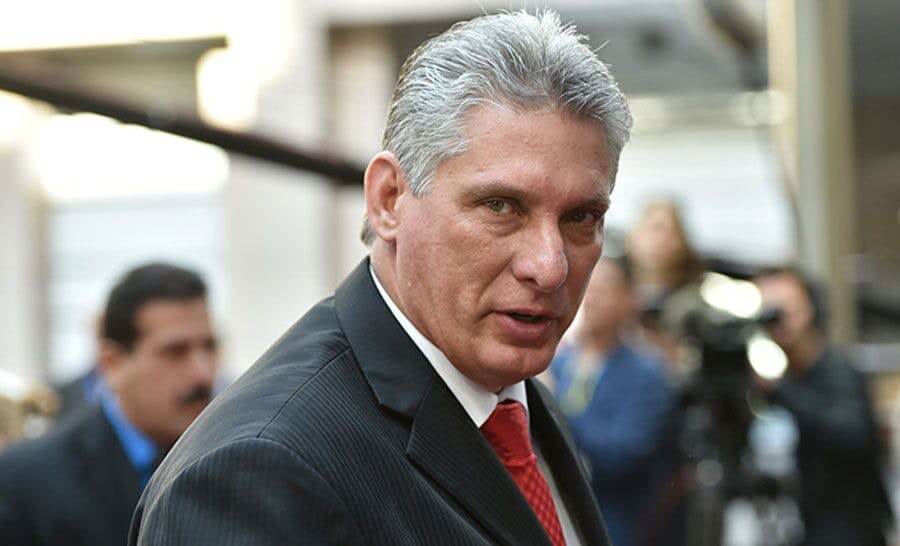NEW YORK (April 19, 2018) — Today, Cuba’s National Assembly of People’s Power elected Miguel Díaz-Canel, Raúl Castro’s handpicked successor, as the new president of Cuba. The long-predicted appointment of Díaz-Canel — which secures the continuation of Cuba’s 59-year-old dictatorship — is the culmination of a lengthy, tightly-controlled election process that was neither free nor fair, and that was aimed at simulating grassroots support for the military elite that rules over the island. Despite Castro’s decision to step down, he will remain at the head of the Communist Party until its next congress convenes in 2021.
“There’s nothing new under the sun in Cuba. Although the Communist Party will likely attempt to announce the election of Díaz-Canel as the ‘beginning of a new chapter,’ they aren’t fooling anyone. The Castro regime remains a brutal dictatorship that denies all Cubans their most fundamental human rights,” HRF President Thor Halvorssen said. “The world must keep the pressure on the last remaining dictatorship in the Western Hemisphere and continue to call for a transition to democracy.”
Orchestrated every five years, Cuba’s single-party electoral process is fraught with repression, and a de facto ban prevents even the most basic independent participation. Regular citizens are prevented from running for office by force unless they can prove their loyalty to the Communist Party and obtain the endorsement of the political police.
Cuba’s electoral process stymied independent candidates from the beginning, starting with the country’s municipal elections in September and October 2017. Most Cubans selected representatives for the municipal assembly from a predetermined ballot. During the voting process, citizens endorsed these predetermined candidates by a show of hands, a system that violates the right to elect representatives freely on a secret ballot. Since the municipal assemblies select representatives for the provincial and national legislatures, local level elections act as a filter to ensure that all delegates to the national assembly are members of the Communist Party of Cuba. For example, not one of the 175 independent candidates presented by the dissident-led campaign #Otro18 made it to the ballot to elect delegates to the municipal assembly. As a result, no #Otro18 candidates are eligible for provincial or national legislative office.
Other independent candidates were prevented from attending the local gatherings where delegates are elected. In a phone call with HRF, a spokesperson from the Cuban civil society group Electoral Facilitators Network (RedFE by its Spanish initials) explained that uniformed and plain-clothed state agents have harassed, assaulted, and arrested its members and raided their homes frequently. According to RedFE, during the latest election cycle, 85 of its members were arbitrarily detained. Acknowledging the government’s modus operandi, then-Vice President Miguel Díaz-Canel expressed to members of the apparatchik that he would be “taking all the necessary steps to discredit” the independent candidates since their very participation in municipal assemblies “would legitimize the counterrevolution.”
After all independent candidates and their supporters were prevented from participating by different means, delegates to municipal and provincial assemblies nominated deputies to the national assembly, among them Raúl Castro as well as then-Vice President Miguel Díaz-Canel. Finally, today, a national assembly exclusively comprised of Communist Party delegates elected Díaz-Canel unanimously as president of Cuba.
“After the death of Fidel Castro, Raúl Castro amped up the Cuban regime's crackdown on dissidents and civil society to signal that, contrary to international propaganda, he would not allow for any democratic change in the island. Today, Cuban democracy activists are confronted with more danger than before, since Díaz-Canel has shown even less tolerance for dissent,” HRF Chairman Garry Kasparov said. “Nevertheless, Cuban dissidents have faced the regime’s cruelty for decades and have shown the world that they will not back down until they have their freedom. They are determined to see democracy in Cuba, but will need the international community's continued support.”
The Human Rights Foundation (HRF) is a nonpartisan nonprofit organization that promotes and protects human rights globally, with a focus on closed societies.
TAKE ACTION! Tell the Cuban dictatorship that they will not fool the outside world. Remind them that democrats from around the world will not tolerate their abuses and will continue to call for a democratic transition in Cuba.
CONTACT:
Anayansi Rodríguez Camejo
Ambassador, Cuban Permanent Mission at the United Nations
Address: 315 Lexington Avenue, New York, NY, 10016
Telephone: (212) 689-7215
Fax: (212) 689 9073
Email: cuba_onu@cubanmission.com
Facebook: https://www.facebook.com/CubatoUN/
Twitter: https://twitter.com/CUBAONU
Please let us know if you took action. CC your communication to: advocacy@humanrightsfdn.wpengine.com.
